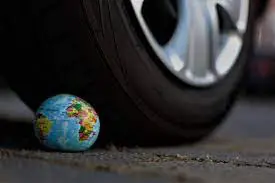The United Nations Climate Change Conference draws to a close, marking “the beginning of the end of fossil fuels.”
The United Nations Conference on Climate Change, also known as COP28, was held in Dubai with the aim of reaching an agreement to completely renounce fossil fuels by 2050. Once this meeting ended, the international organization has reported that Through negotiations, an agreement was reached that marks “the beginning of the end of fossil fuels.” But how does this cover affect the world of marketing?
Simon Stiell, executive secretary of UN Climate Change, noted in his closing speech that, although Dubai has not definitively turned the page on the era of fossil fuels, “the beginning of the end” has begun. Furthermore, he added that “all governments and businesses must now turn these commitments into real economic results, without delay.”
With the closing of this meeting, where almost 200 countries agreed on a new global pact with the aim of addressing climate change, with some gaps. Several agreements on aspects such as agriculture and food also became the main topics of this climate summit, and public relations companies that took a stand against fossil fuels assumed a prominent role in the international meeting.
Business leadership: the world of marketing at COP28
Regenerative agriculture was one of the fundamental points of the global agreement, where nations are urged to increase this type of agriculture in order to alleviate the effects of the industry on the planet. As reported by AdWeek, Ethan Soloviev, innovation director of the sustainability intelligence platform HowGood, at this conference “there was greater nuance and awareness around food that I had never seen before.” In this sense, the professional highlights that “the Including food in the global balance is a great step for food systems.
Brands from the world of food such as Nestlé, Unilever and Carrefour had a presence at COP28, but it is, in Soloviev’s words, less of a brand marketing strategy and more focused on collaborating with NGOs, activists and suppliers to promote the language of food systems is recognized in the treaty.
Advertising takes the floor at COP28
COP28 makes it clear that to maintain an acceptable climate for life and the planet, it will be necessary to reduce the production of coal, oil and gas; tripling renewable energy capacity In addition, this year’s conference also marks a milestone for the advertising sector with the participation of the first advertising agency in the UN event on climate change.
Alberto Fernández, CEO of Normmal who also has a long history of eco-activism, has been invited by the United Nations to participate in COP28, where he explained that advertising is a sector that emits a significant amount of CO2. As of today, it is estimated that digital advertising is responsible for the emission of 82 million tons of CO2 per year worldwide.
In the UK, for example, the digital ecosystem is responsible for 3.5% of all greenhouse gas emissions produced. It is estimated that a single campaign generates 70 tons of CO2 emissions, the same amount as 7 people during a year in any developed country.
«Evidently we are not proud of being a sector
pollutant and therefore we must be part of the solution,” claimed Fernández: “At Normmal we began a long time ago by editing with ADGREEN the first Sustainable Advertising Guide in Spanish, a resource guide for sustainable and responsible advertising with the climate crisis. , equipped with important information so that creative and media agencies can reduce their carbon footprint and contribute to the common good,” explained the professional.
Furthermore, Fernández highlighted that “all companies play a crucial role in the fight against climate change, but in our case, we have a decisive tool: We can promote awareness and sustainable action through our campaigns, not only to advertisers. and to the media, but also to society. We must be at the summits, in decision-making, in the analysis of the situation and in the change of paradigms. We must become aware and act now.”
The problem of Greenwashing
When the world of brands and sustainability become intertwined, there is a term that often appears: greenwashing, that is, when brands try to pass off certain actions as sustainable initiatives when they are not. Although activism has become a strong trend, many point out this “washing of image” that the world of marketing presents.
For example, the activist group Clean Creatives presented the report “The F-List” in September of this year, which gives names and surnames to the 294 agencies that worked for fossil fuel companies in 2022 and 2023.
At COP28, the presence of public relations companies also stood out, trying to advocate for companies in the world of fossil fuels. Tom Brookes, CEO of climate communications firm Global Strategic Communications Council explains that the public relations world of the fossil fuel industry has been part of this process for a long time. But, “we hadn’t seen anything like the scale of involvement from PR agencies that we have this time.”
Furthermore, regarding the presence of these companies from the world of marketing at COP28, AdWeek points out, through the statements of Harriet Kingaby, director of ACT Climate Labs and co-president of Conscious Advertising Network, that “we now see that their influence (of the public relations firms) in the final text of the global balance sheet, may not only endanger climate action but also create space for the industry to intensify greenwashing. Kingaby argued: “we need to remain vigilant and take measures to further protect the integrity of information on climate change to prevent such contamination in the media space in the future,” she concludes.








